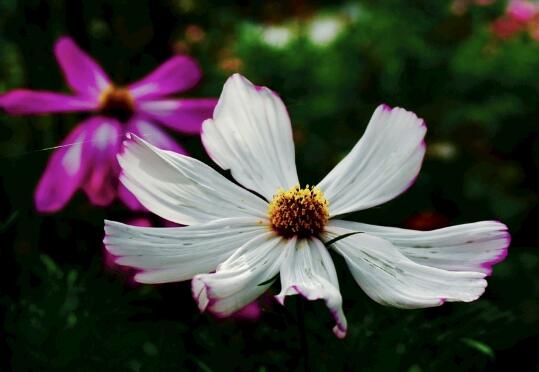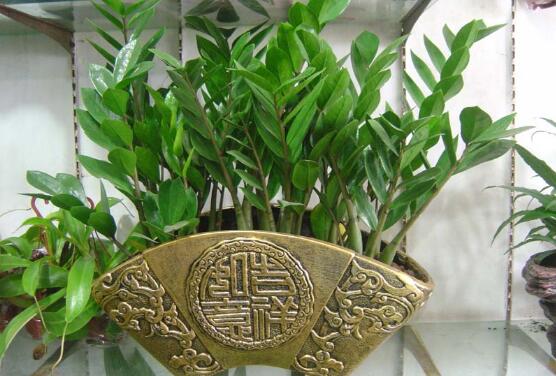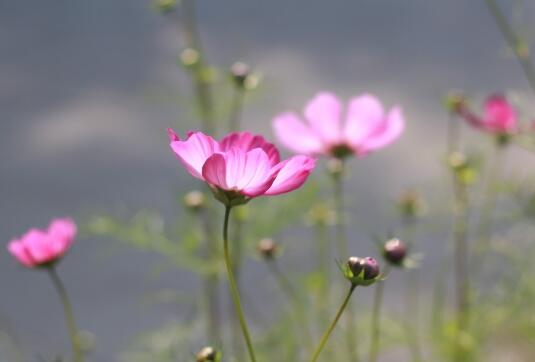How to raise cosmos, cultivation methods and precautions of cosmos/sunshine should be sufficient
Persian chrysanthemum is a kind of highly ornamental plant, which can be seen in many parts of our country. There are many people who raise it in our country, but if we want to raise it well, we need to pay attention to it. So how to raise Persian chrysanthemum? What are the breeding methods and matters needing attention of Persian chrysanthemum? Next, the editor will take you to learn about it.
First, how to raise Persian chrysanthemum and understand the habits

If we want to know how to raise Persian chrysanthemum, we must first understand its growth habits. Persian chrysanthemum is a light-loving plant, so we should maintain sufficient light when we breed it. In addition, watering, fertilization and other aspects also need to pay attention to. Details are introduced below, and we will move on.
2. Culture methods and matters needing attention of Persian chrysanthemum
1. Soil selection, good drainage.
In the breeding methods and matters needing attention of Persian chrysanthemum, choosing soil is the first step, and it is also a step to lay a good foundation. Only by choosing the right soil can Persian chrysanthemum grow more healthily. Persian chrysanthemum prefers to grow on loose sandy soil, which has good drainage and is not easy to accumulate water.
Note: the soil of Persian chrysanthemum should not be too fertile, otherwise it will have a certain impact on its growth, as long as the general soil has a certain degree of looseness.
two。 Fertilizer requirements, avoid big fertilizer
Persian chrysanthemum does not have a great demand for fertilizer during its growth. If there is a base fertilizer in the soil when we plant it, there will be no need to apply fertilizer after entering the growing period, because if we apply too much fertilizer, it will make the juice grow too much, thus reducing the number of flowers.
Note: if we release the flowers of base fertilizer in the soil before planting, the fertilizer must be diluted with water so that it can be absorbed, because this kind of plant is afraid of big fertilizer.
3. Watering requirements, small amount and more watering
Among the breeding methods and precautions of Persian chrysanthemum, watering is a point that needs to be paid attention to. This kind of plant likes water more. If the weather is dry, it should be watered 2-3 times a day, and once every 1-2 days when the climate is suitable.
Note: when we water the Persian chrysanthemum, we should remember to water a little more, keep the soil moist, do not water too much, otherwise it will easily cause the root of the Persian chrysanthemum to rot.
4. Lighting requirements, pay attention to shade in summer
Persian chrysanthemum is more like light, but can not bear strong light, if the spring and autumn sunshine is more suitable, we can keep it outdoors for a long time to receive light, but when the summer sunshine is too strong, we still need shade.
Note: we can move it to the indoor semi-shade in summer, so that its growth will not be affected. In winter, on the contrary, we have to keep it indoors. Wait until the noon temperature rises and receive 2-3 hours of light outside.
5. Timely prevention and control of diseases and insect pests
In the growth process of Persian chrysanthemum, if we do not maintain properly, it is easy to have some diseases and insect pests and other problems, this kind of problems do great harm to the plant, not only affect its ornamental, but also lead to the phenomenon of drying up and death.
Note: in the emergence of diseases and insect pests and other problems, we must deal with them in time, if the time is prolonged, it will be very difficult to cure, specific prevention and control methods you can refer to the Persian chrysanthemum pest control article, here the editor will not introduce too much.
How to raise Persian chrysanthemum? Family Culture methods of Persian Chrysanthemum
Persian chrysanthemum likes light, tolerance to poor soil, avoid fertilizer, avoid heat, avoid stagnant water. In short, it is a very "proud" flower plant, but it can not bear its beautiful flowers, so it is also loved by many flower friends. So, how to raise Persian chrysanthemum in family farming? Let's take a look:
Picture: Persian chrysanthemum potted plant
1. Family culture methods of Persian chrysanthemum
1. Light
Persian chrysanthemum is strong, likes the sun, and can be maintained in short days. It should be noted that Persian chrysanthemum is not strict with the soil. If it is transplanted into the early fertile soil and the light is not strong, the plant is very easy to grow.
two。 Water and fertilizer management
Watering: Persian chrysanthemum likes water. it can be watered 2-3 times a day during drought and 1-2 days on weekdays. But avoid stagnant water in the basin.
Fertilization: if the base fertilizer is applied when planting in the pot, there is no need to apply fertilizer during the growing period. if the soil is too fertilised, the branches and leaves will grow easily and the flowering will decrease. Or apply 5 times the water of rotten urine every 10 days during the growth period.
3. Mode of reproduction
Sowing: the sowing of Persian chrysanthemum takes place from March to April. The seedlings are transplanted when they have 4 or 5 true leaves, and the hearts are removed, and they can also be planted after direct seeding.
Cuttage: the use of softwood cuttings in summer has a high survival rate. In May, you can select a sturdy top branch, cut a section 8 cm to 10 cm long as cuttings, and insert 3 to 5 plants in a flowerpot. The pot should be buried in the soil, exposing 4 cm to 5 cm, watering and shading, and rooting half a month later. Apply thin fertilizer solution every 15 days after rooting, and then remove the terminal bud when it reaches 15 cm to promote more branches. If the fertilizer and water are controlled properly, the flowers can be seen in about 45 days.
Picture: Persian chrysanthemum
II. Matters needing attention in family culture of Persian chrysanthemum
1. Anti-lodging
Persian chrysanthemum plants are tall and easy to sway in the wind, but they are also easily broken by the wind. If you want to cultivate a short, unlodging Persian chrysanthemum, you should postpone the sowing date to July, or pick the heart when the plant grows to 40-50 cm after sowing in spring, and let the axillary buds bloom.
two。 Prevention of diseases and insect pests
The main diseases of Persian chrysanthemum are leaf spot and powdery mildew, which can be sprayed with 500 times of 50% Taub wettable powder. The insect pests that Persian chrysanthemum pay attention to are aphids, beetles, etc., which can be sprayed with 2500 times of deworming essential oil. Red spider damage is easy to occur when it is hot, so it is advisable to prevent it as soon as possible.
The above is about the introduction of family breeding methods of Persian chrysanthemum, I hope it can be helpful to everyone!
Matters needing attention in the culture of Persian chrysanthemum
Persian chrysanthemum like light plants, like light, resistant to barren soil, avoid fertilizer, soil is too fertile, avoid heat, avoid stagnant water, do not adapt to high temperature in summer, not resistant to cold. Loose, fertile and well-drained loam is needed.
Propagation methods of Persian Chrysanthemum
1. Sowing or cutting propagation.
Persian chrysanthemum propagates with seeds. Generally sowing in early spring, flowering from May to June, hot climate from August to September, more overcast and rainy, flowering less. After the cool autumn, it continued to blossom until Frosts Descent. If it is sown from July to August, it will blossom in October, and the plant will be short and neat. Persian chrysanthemum seeds have the ability to self-sow, once planted, will produce a large number of self-sowing seedlings, if a little protection, can blossom as usual. It can be sowed in the open bed in the middle of April, and the seedlings can be unearthed if the temperature is suitable for about 6-7 days.
2. Cutting propagation is feasible during the growth period. Some robust shoots on the left side of 15cm are cut under the node and planted in sandy soil. Proper shading and humidity can take root in 5 to 6 days. It was sown in spring in April, germinated quickly, and germinated 7-10 days after sowing. It can also be propagated by tender wood cuttings and take root 15-18 days after cuttage.
Seedlings with 4-5 true leaves when transplanted, and heart-picking, can also be direct seeded seedlings. If the planting land is fertilized with base fertilizer, there is no need to apply fertilizer during the growing period. if the soil is too fertilised, the branches and leaves will grow easily and the flowering will decrease. During the period of high temperature from July to August, those who blossom are not easy to bear seeds. The seeds are easy to fall off after maturity and should be collected in the early morning. Persian chrysanthemum is a short-day plant, spring seedlings often have few leaves and flowers, while summer seedlings are short, neat and blossom continuously.
Cultivation and management of Persian chrysanthemum
Persian chrysanthemum is strong in nature, likes sunshine, is resistant to drought, and is not strict with the soil, but can not accumulate water. If it is planted in fertile soil, it is easy to cause branches and leaves to grow and affect the quality of flowering.
The seedlings were transplanted with a height of 5 cm, and the leaves were colonized with 8 leaves, and the seedlings could also be planted after direct seeding. If the planting land is fertilized with base fertilizer, there is no need to apply fertilizer during the growing period. if the soil is too fertilised, the branches and leaves will grow easily and the flowering will decrease. Or apply 5 times the water of rotten urine every 10 days during the growth period. When it is dry, it can grow and blossom well if it is watered for 2 or 3 times. During the period of high temperature from July to August, those who blossom are not easy to bear seeds. The seeds are easy to fall off after maturity and should be collected in the early morning. Persian chrysanthemum is a short-term plant, spring seedlings tend to have few leaves and flowers, summer seedlings are short, neat and blossom constantly. It grows rapidly and can be plucked many times to increase branching.
Persian chrysanthemum plants are tall, and pillars should be set up in the windward to prevent lodging and damage. Generally, dwarf plants are bred, that is, the top is removed when the seedlings are 20~30cm high, and then the new apical buds are removed several times in succession, the plants can be dwarfed, and the number of flowers is also increased. The planting nursery should apply a little base fertilizer. Seed picking is suitable for picking achenes when slightly blackened, so as not to scatter after maturity.
Cultivation of Persian chrysanthemum:
In the seedling stage, this species can blossom normally after short-day treatment, and the suitable sowing time should be mastered; direct seeding on the open ground can also raise seedlings; sowing and covering soil is about 1cm, and seedlings emerge in about 5-10 days; seedlings are transplanted with 5-6 true leaves with a planting distance of 30-50cm, and coring is carried out during the growing period to promote branching and control excessive height so as to avoid lodging in the later stage. The requirements of the soil are not strict, but not stagnant water, not cold-resistant, avoid extreme heat. Resistant to barren soil.
Key points of maintenance of Persian chrysanthemum
Reproduction: sowing or cutting propagation. Softwood cuttings can also be used in summer.
Sow seeds in late March and early April and sow seeds in open-field seedbeds. The ground temperature can also germinate at a low temperature of 15 ℃, but if sown early, it will grow into a giant plant with a height of 2m, which is easy to lodge because of typhoons or plant weight. There are also early blooming varieties that bloom 50-70 days after sowing, so they should be divided into early blooming and autumn blooming to sow seeds.
Management: like warm and damp to the sun, slightly resistant to early frost, lax requirements on the soil. The seedlings were transplanted with a height of 5 cm, and the leaves were colonized with 8 leaves. The requirement of fertilizer and water is not strict, and 5 times the mature urine is applied every 10 days during the growth period. High and medium-sized varieties need to set up pillars before flowering to prevent wind disaster and lodging. It grows rapidly and can be plucked many times to increase branching. Red spider damage is easy to occur when it is hot, so it is advisable to prevent it as soon as possible. Such as sowing from late July to early August, it can blossom in 60 days after 50m / ml, and the plant is short and neat, which can be used for National Day. After the seeds are ripe, you can choose to cut off the colorful inflorescences and dry them in the sun to leave the seeds.
If you want to cultivate a short, unlodging big Persian chrysanthemum, the following countermeasures should be taken:
① was sown later in July.
When ② grows to 40-50cm after spring sowing, it will pick its heart and let axillary buds blossom.
③ should set up dwarf bamboo and other pillars as soon as possible.
The disease and harm of Persian chrysanthemum:
Measures must be taken to deal with mildew, aphids and spider mites. Spray carbendazim on mildew and Ortolan granules on pests.
- Prev

How to raise the cash cow, the breeding method and precautions / acid soil watering
Money tree, also known as money tree, it is very common indoors, is a beautiful and good-looking plant, deeply loved by flower friends. In life, many people want to raise a cash cow, but they don't know how to raise it. In this regard, the editor carefully sorted out the cultivation methods and matters needing attention of the money tree, which is very comprehensive.
- Next

How to water and fertilize Persian chrysanthemum, avoid stagnant water / fertilization and apply thin fertilizer frequently.
Persian chrysanthemum is a kind of flower plant native to America, and there are many people raising Persian chrysanthemum in our country, but there are many places that need to pay attention to if we want to raise it well, among which watering and fertilization is the most important. So how to water and fertilize Persian chrysanthemum? Next, the editor will take you to learn about it.
Related
- Fuxing push coffee new agricultural production and marketing class: lack of small-scale processing plants
- Jujube rice field leisure farm deep ploughing Yilan for five years to create a space for organic food and play
- Nongyu Farm-A trial of organic papaya for brave women with advanced technology
- Four points for attention in the prevention and control of diseases and insect pests of edible fungi
- How to add nutrient solution to Edible Fungi
- Is there any good way to control edible fungus mites?
- Open Inoculation Technology of Edible Fungi
- Is there any clever way to use fertilizer for edible fungus in winter?
- What agents are used to kill the pathogens of edible fungi in the mushroom shed?
- Rapid drying of Edible Fungi

